April 15, 2025 | 19:59 GMT +7
April 15, 2025 | 19:59 GMT +7
Hotline: 0913.378.918
April 15, 2025 | 19:59 GMT +7
Hotline: 0913.378.918
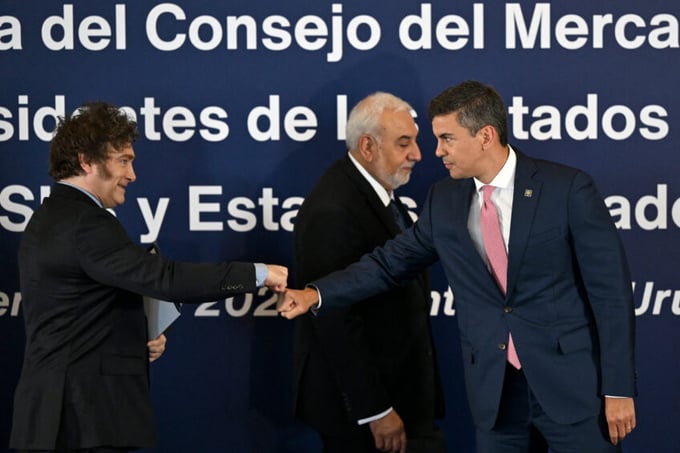
Argentina's President Javier Milei (L) greets Paraguay's President Santiago Pena during the LXV Mercosur Summit in Montevideo on 6 December 2024. Mercosur and the European Union have concluded "negotiations for a free trade agreement", European Commission president Ursula von der Leyen announced in Montevideo. Photo: ANP.
The European Commission has officially signed the long-debated Mercosur Free Trade Agreement. While heralded as a landmark for trade, this deal comes with significant risks for European agriculture, food security and sustainability, warns AVEC, the voice of the European poultry meat sector.
The new agreement prioritises the export of processed agrifood products while importing raw materials, thus exposing the EU to great dependency on Mercosur countries for essential agricultural goods, such as poultry, sugar, beef, and rice, and, according to AVEC, “potentially sacrificing the established European high standards our producers have fought for and our citizens expect”.
Birthe Steenberg, secretary general of AVEC, the Association of Poultry Processors and Poultry Trade in the EU countries: “The EU-Mercosur agreement isn’t just a trade deal, it’s a trade-off. By favouring short-term export gains, the EU puts our strategic autonomy in agriculture on the line, undermines EU farmers and, ultimately, jeopardises its long-term sovereignty.”
President of the European Commission, Ursula von der Leyen, however, stated: “This is a win-win agreement, which will bring meaningful benefits to consumers and businesses, on both sides. We are focused on fairness and mutual benefit. We have listened to the concerns of our farmers and we acted on them. This agreement includes robust safeguards to protect your livelihoods…”
EU-Mercosur trade agreement
For about 25 years, the EU has negotiated with the Mercosur countries, being Argentina, Bolivia, Brazil, Paraguay and Uruguay. In essence, the trade agreement will eliminate import duties on various products. For EU countries, it will become cheaper and easier to export cheese, wine, medicines and cars to the Latin American countries. In return, the countries in Latin America can export meat, soy, car parts and raw materials more affordably. The trade deal covers about 20% of the global economy and every year, trade between the EU and Mercosur countries is worth tens of billions of euros, affecting more than 700 million people. The next step in the process is that the deal must be legally tested and translated into all official EU languages. It will then be submitted to each of the 27 EU member states. That process is expected to take several months.
A blow to EU poultry meat production
The proposed additional quota of 180,000 tonnes from Mercosur equates to production levels of countries like Finland, Sweden and Denmark combined.
“In total, cumulating existing imports and Mercosur quota, we would import 1.1 million tonnes of poultry meat into the EU, representing 9% of the EU’s poultry meat consumption. This is a sizeable volume, and it comes at a time when trade deals are under renegotiation with Ukraine and Thailand, which are also significant poultry exporters,” stated AVEC.
Poultry imports under the Mercosur agreement disproportionately target some of the most valuable and in-demand cuts for European consumers, such as chicken breasts, noted AVEC. Since EU producers rely on breast meat sales to justify raising chickens, each 2 fillets imported from abroad represent 1 chicken not raised in the EU.
Already 25% of breast meat consumed in the EU comes from non-EU countries (such as Brazil, Thailand, Ukraine, and China).
Sacrificing standards and sustainability
“EU producers adhere to some of the world’s highest standards for animal welfare, environmental protection, and food safety, and invest heavily in sustainable practices. While the EU continues to implement stricter regulations to enhance sustainability and animal welfare – thus making local production increasingly expensive – European farmers face growing competition from imports produced under far lower requirements,” said AVEC.
Recent audits by DG SANTE2 have revealed systemic issues in Brazil’s compliance with EU standards, including food safety breaches and poor animal health practices, said AVEC. It added that the Mercosur deal highlights a “glaring disparity”. “If adhering to the EU’s exemplary standards ultimately leads to our producers being outcompeted by less sustainable imports, what is the point of setting such benchmarks without ensuring reciprocity and fair trade conditions?” questions Steenberg.
A call for action
The Mercosur agreement will have devastating consequences for European food security, sustainability, farmers and consumers alike, says AVEC, urging EU policymakers in Council and the European Parliament to oppose this deal. “More importantly, policy-makers should avoid by any means letting the Commission split the agreement, and therefore allowing fast track approval. That would prevent a fair democratic process to occur for the adoption of the agreement, especially when countries like Poland and France have officially expressed their opposition to the agreement. The EU must lead by example, uphold its values – both at home and abroad – and prioritise its farmers, its consumers, and its future,” said AVEC.
“The EU-Mercosur trade deal, as it stands, is not the lifeline we need, it’s a risky gamble we can’t afford,” Steenberg concluded.
(Poultryworld)
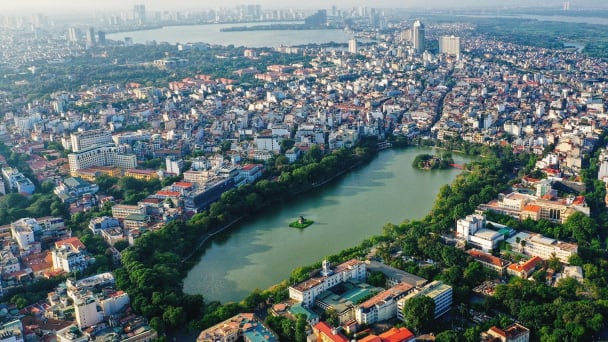
(VAN) After the merger, key leadership personnel of the provinces must consult with the General Secretary, key leaders, and the Standing Secretariat.
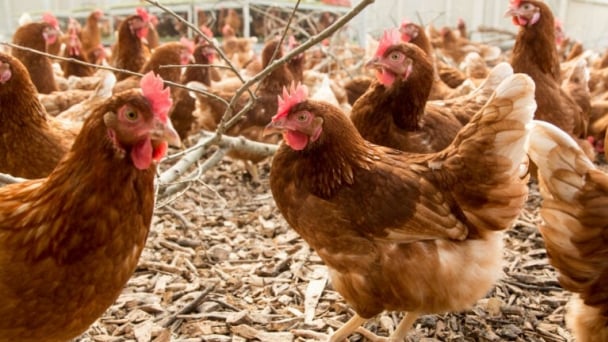
(VAN) The latest Business Benchmark on Farm Animal Welfare (BBFAW) reveals steady progress on farm animal welfare across the global food industry.
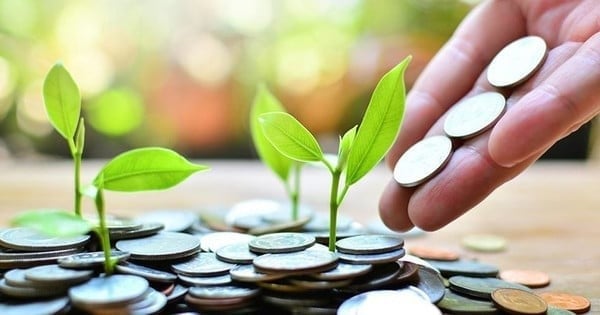
(VAN) Green credit is a financial policy that effectively supports environmentally friendly projects and activities today.
/2025/04/09/1049-2-165919_630.jpg)
(VAN) With a revenue of less than VND 30 billion/year, packaging producers are exempted from EPR liability under Decree No. 05/2025 newly issued.
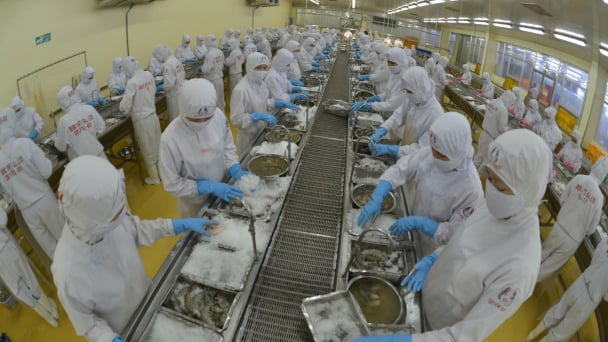
(VAN) Ministry of Agriculture and Environment has issued an Action Plan for sector's development in the coming period, aiming for a growth rate of 4% or higher and an export turnover of USD 65 billion.
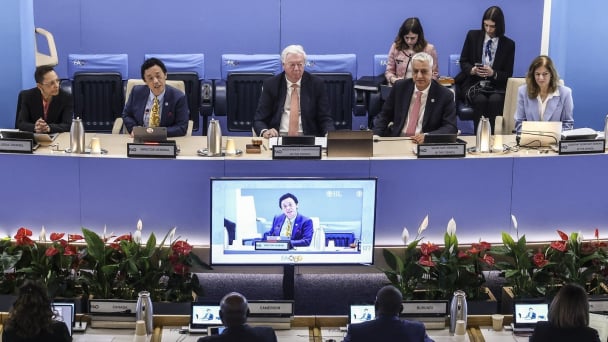
(VAN) The 177th Session of the FAO Council opened on Monday at the Organization’s headquarters in Rome.

(VAN) In a statement, the Federation of Free Farmers (FFF) said the government must not be complacent over the reciprocal tariffs even if the Philippines will be slapped with the second lowest rate among US trade partners.